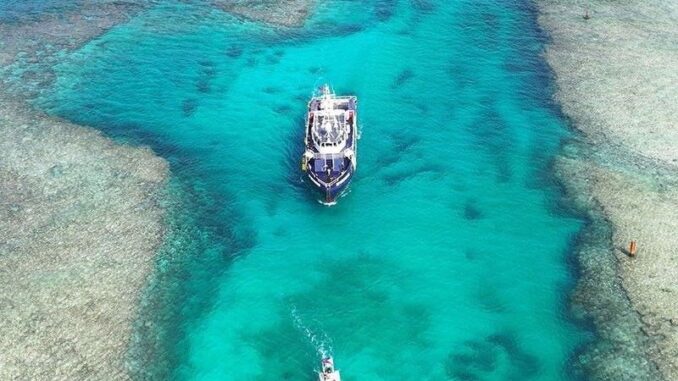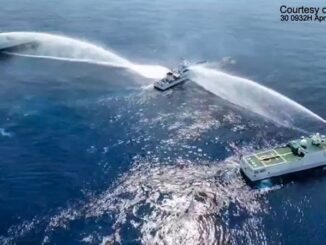
MANILA, Philippines — The Philippines can count on continued US support amid repeated harassment at sea by the Chinese whose maritime claims in the South China Sea (SCS) have no legal basis, according to the US State Department.
“There’s no legal basis for the PRC’s maritime claims in the South China Sea, and the dangerous ways in which it attempts… to enforce those claims put Filipino lives and livelihood at risk,” State Department spokesman Matthew Miller said at a press briefing yesterday, referring to China by its official name.
“It is up to the Philippines to decide how they operate their vessels in areas where it enjoys the freedom of navigation on the high seas under international law, and I wouldn’t want to forecast what this particular incident might mean other than to say that we continue to support our Philippine allies,” he said.
Miller’s assurance came after the departure from Escoda Shoal of the only Philippine Coast Guard (PCG) ship stationed in the area.
Executive Secretary Lucas Bersamin, who also chairs the National Maritime Council (NMC), confirmed on Sunday that the BRP Teresa Magbanua left Escoda Shoal after being deployed in the area in the past five months.
Bersamin said the PCG vessel had to sail back to its home port in Palawan so that it could undergo repairs and allow its crew to have furlough and attend to their medical needs.
At a meeting of the Bilateral Consultation Mechanism in Beijing on Wednesday last week, the Philippines firmly voiced its position that Escoda Shoal is within the country’s exclusive economic zone (EEZ).
The Department of Foreign Affairs (DFA) said on Thursday Undersecretary Ma. Theresa Lazaro had a “frank” and “candid” exchange of views with Chinese Vice Foreign Minister Chen Xiaodong on managing the situation in the West Philippine Sea, including in Escoda Shoal.
It was during the meeting that Chen asked Philippine officials to immediately pull out a PCG ship from Escoda Shoal, apparently referring to Teresa Magbanua.
“Emphasizing that Escoda Shoal is within the Exclusive Economic Zone of the Philippines, Undersecretary Lazaro reaffirmed the consistent position of the Philippines and explored ways to lower the tension in the area,” the DFA said in a statement.
Defense of allies
In a high-level military-to-military talks with their Chinese counterparts in Beijing over the weekend, US defense officials reaffirmed their commitment to peace in the Indo-Pacific region as well as their readiness to defend allies.
Michael Chase, deputy assistant secretary of defense for China, Taiwan and Mongolia, led the US delegation to Beijing for the 18th iteration of the Defense Policy Coordination Talks between the US and China.
“DOD also reaffirmed the US commitment to defending its Indo-Pacific allies, and the department emphasized the importance of respect for freedom of navigation as guaranteed under international law in light of ongoing aggressive PRC (People’s Republic of China) harassment against lawfully operating Philippine vessels in the South China Sea,” a senior official said at the conclusion of the talks.
The US delegation expressed concern over China’s increasingly coercive behavior in the region.
The US delegation also underscored the importance of maintaining peace and stability across the Taiwan Strait, and called the attention of China to provocations from North Korea.
Last week, the commander of US Indo-Pacific Command Admiral Samuel Paparo warned China against the use of dangerous, coercive and escalatory tactics in the South China Sea against US allies in a video teleconference with China’s Gen. Wu Yanan, commander of the People’s Liberation Army’s Southern Theater Command.
Following the latest talks in Beijing, officials emphasized that the military-to-military dialogue did not signal a change in the US approach to China.
“The department continues to view (China) as our pacing challenge as described in the National Defense Strategy,” a senior official said. “(China) continues to be the only US competitor with the intent and, increasingly, the capability to overturn the rules-based infrastructure that has kept peace in the Indo-Pacific since the end of the Second World War.”
The official added that the US “remains clear-eyed about China’s intentions and their actions in the region and around the world.”
Chinese paranoia
In an interview with “Storycon” on One News yesterday, PCG Commodore Jay Tarriela said the heightened level of Chinese aggression in Escoda Shoal in August was due to paranoia over a possible grounding of Teresa Magbanua in the shoal.
“It’s just their paranoia. They were just so paranoid believing their own narrative that Teresa Magbanua, the most expensive vessel that we have, will be run aground,” Tarriela, who is also spokesman for the National Task Force for the West Philippine Sea, said.
The Philippines has repeatedly stated that it does not intend to ground a second vessel in the West Philippine Sea.
The BRP Sierra Madre, still considered an active vessel of the Philippine Navy, was run aground in Ayungin Shoal in 1999.
“We have repeatedly said it … We’re just basically exercising our sovereign rights and protecting our marine environment. But despite that, they still think that our intention is to ground (Teresa Magbanua),” said Tarriela.
In the same program, NMC spokesman Vice Admiral Alexander Lopez said the pullout of Teresa Magbanua from Escoda had President Marcos’ approval.
“When we say strategic presence, it does not necessarily mean that we will put a vessel there permanently or static. We can do monitoring, we can do the coverage, we can do the documentation, we can detect any illegal activities not only by putting a ship in the area,” Lopez said in English and Filipino.
Asked about the offer of the US to escort Philippine vessels on supply missions, Lopez said the government is studying its implications.
“We are still not pushed to the wall … we still have some dignity, we have some pride,” he said in Filipino. “If push comes to shove and worse comes to worst, it will be an executive decision whether to tap the offer.”
Fewer Chinese vessels
Meanwhile, the number of Chinese vessels in the West Philippine Sea (WPS) has decreased to 157 from 207 recorded last week, the Philippine Navy reported yesterday.
From Sept. 10 to 16, the Navy observed 123 Chinese maritime militia (CMM) vessels, 26 China Coast Guard (CCG) ships, seven People’s Liberation Army Navy (PLN) warships, and one research vessel within the country’s EEZ. — Mark Ernest Villeza, Janvic Mateo





Be the first to comment